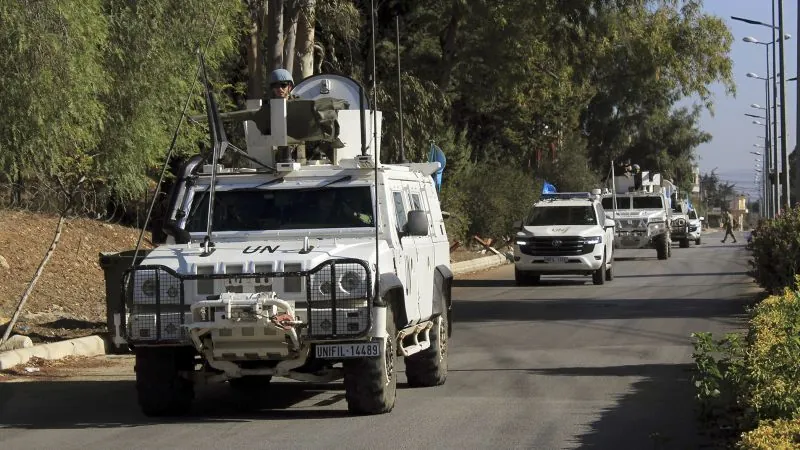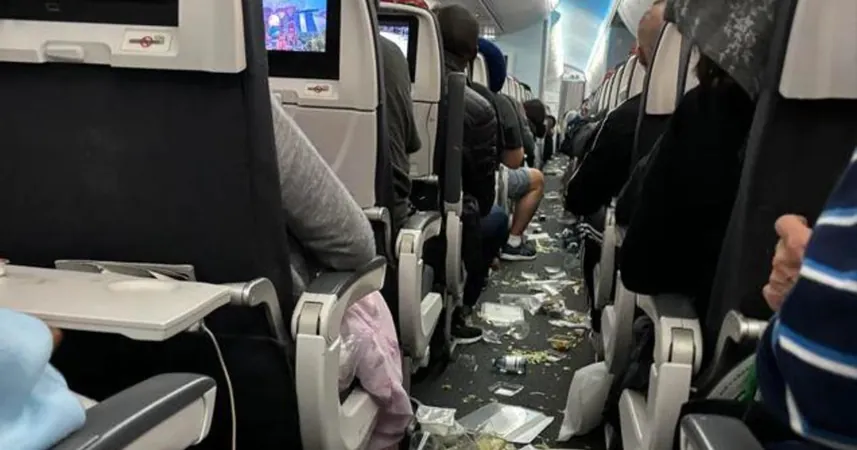
UNIFIL: What You Need to Know About the United Nations Peacekeeping Force on the Israel-Lebanon Border
2024-10-14
Author: Michael
In a shocking escalation of tensions, the United Nations has reported a series of alarming incidents involving the Israeli military and UN peacekeeping forces in southern Lebanon over the past week. These events have raised intense scrutiny from the international community, with many condemning Israel's actions against UNIFIL (United Nations Interim Force in Lebanon) – a peacekeeping mission that has been operational for over 45 years.
Recent Violations and International Outcry
Reports indicate that Israeli forces have fired upon UNIFIL peacekeepers, unlawfully entered their camps, halted logistical support, and caused injuries to more than a dozen troops stationed in the region. UNIFIL has described these violations as “shocking,” calling for immediate accountability.
Israeli Prime Minister Benjamin Netanyahu has responded by alleging that Hezbollah operates near UNIFIL posts, claiming that the peacekeeping forces are somehow obstructing military operations. He expressed regret for the injuries sustained by peacekeepers but urged UN Secretary-General António Guterres to withdraw them from the area immediately.
Guterres did not gloss over the seriousness of these attacks, suggesting they "may constitute a war crime." He underscored that UNIFIL and its personnel must never be targeted, reaffirming the UN’s commitment to maintaining its presence in Lebanon despite ongoing threats.
Timeline of Aggression Against UNIFIL
Here’s a disturbing snapshot of recent events: - **Wednesday:** UNIFIL reported being deliberately targeted by Israeli Defense Forces (IDF) in Labbouneh, where a position was damaged. - **Thursday:** An IDF tank fired upon an observation tower at UNIFIL’s Naqoura headquarters, injuring two peacekeepers. - **Friday:** UNIFIL troops suffered injuries due to explosions near their positions, with the IDF claiming an “immediate threat” from the area. A peacekeeper was shot in Naquora amid military operations, and nearby UN facilities sustained significant damages. - **Saturday:** The IDF obstructed critical logistical movements essential for UNIFIL operations. - **Sunday:** IDF tanks reportedly backed into a UNIFIL post in violation of international law, with Israel later justifying this as a necessary action to evacuate injured personnel.
Condemnations poured in from various nations, including France and the UK, who expressed disbelief and disapproval that Israel appeared to be deliberately targeting UN bases.
What Is UNIFIL? A Peacekeeping Mission with a Complex History
Established in 1978 in response to Israel's first invasion of southern Lebanon, UNIFIL's initial mandate was to oversee the withdrawal of Israeli forces and restore peace and security. Over the years, its role has evolved, particularly following Israel’s second invasion in 1982, which led to the creation of a security zone that remained until Israeli withdrawal in 2000.
In 2000, UNIFIL established the Blue Line, a demarcation spanning approximately 120 kilometers (75 miles) that serves as a de facto border between Israel and Lebanon due to ongoing territorial disputes. The peacekeepers operate in an area fraught with tensions, including Hezbollah strongholds, and their critical mission includes monitoring potential border violations.
While primarily a peacekeeping force, UNIFIL troops are equipped to respond with force in self-defense, and when necessary, to protect civilians and UN personnel.
Composition and Mandate
The force currently consists of more than 10,000 personnel from over 50 countries, with significant contributions from Indonesia, Italy, India, Nepal, Ghana, and Malaysia, among others. UNIFIL operates within a geographical span of 410 square miles between the Blue Line and the Litani River, maintaining 50 positions, with its headquarters in Naqoura.
UNIFIL’s mandate is subject to annual renewal by the UN Security Council, with the most recent extension granted until August 31, 2025. As tensions continue in the vicinity of the Israel-Lebanon border, the future of this peacekeeping mission and its personnel remains precarious and in need of global attention.
The Underlying Question: Will UNIFIL Survive the Escalating Conflict?
As the situation intensifies, the effectiveness of UNIFIL in mediating peace and ensuring security remains uncertain. With its personnel facing direct threats, the international community is left wondering, what will it take to safeguard these peacekeepers? Only time will tell if UNIFIL can continue its vital role or if it will be forced to reevaluate its presence in the region.









 Brasil (PT)
Brasil (PT)
 Canada (EN)
Canada (EN)
 Chile (ES)
Chile (ES)
 España (ES)
España (ES)
 France (FR)
France (FR)
 Hong Kong (EN)
Hong Kong (EN)
 Italia (IT)
Italia (IT)
 日本 (JA)
日本 (JA)
 Magyarország (HU)
Magyarország (HU)
 Norge (NO)
Norge (NO)
 Polska (PL)
Polska (PL)
 Schweiz (DE)
Schweiz (DE)
 Singapore (EN)
Singapore (EN)
 Sverige (SV)
Sverige (SV)
 Suomi (FI)
Suomi (FI)
 Türkiye (TR)
Türkiye (TR)